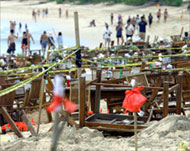Bali a soft target, experts say
Lulled into a false sense of security by the logic that lightning does not strike the same place twice, thousands of tourists had been returning to Bali over the past two years, only to be caught up again in another attack.

Almost three years to the day after the 2002 Bali nightclub bombings, the popular island resort made headlines when 26 people were killed and several others injured in near simultaneous attacks against tourist centres on 1 October.
“Of course they were sending a message,” Indonesia’s anti-terror chief, General Ansyaad Mbai, told Aljazeera.net. “It’s a symbolic attack, and they aimed to threaten people and to frighten them.”
General Mbai believes Jemaah Islamiyah (JI), the Southeast Asian group blamed for the 2002 attacks on two nightclubs, may be behind the latest bombings.
“Based on the modus operandi, police believe that it is the same [group] as those behind the Bali bombings,” he said.
In 2002, bombs were timed to explode simultaneously; this coupled with the fact the bombs targeted one of the busiest times for the resort, all suggest JI handiwork, he said.
Increased security
Bali tightened its security after the 2002 attacks, and had just begun luring tourists back in droves. Many visitors interviewed last year on the eve of the second anniversary of the nightclub attacks, said they were sure Bali would not be hit again.
Jakarta suffered an attack, on the JW Marriott Hotel, in August 2003 and another in September 2004 on the Australian embassy.
Extra security for hotels, restaurants, embassies and foreign companies in Jakarta, employed after the 2002 attacks, made it harder for terrorists to attack targets in the Indonesian capital, says Martin Hughes, a security consultant in Jakarta.
 |
|
Security on Bali is lax compared |
“There’s been a lot of focus on security in Jakarta. But in Jakarta you don’t have the sidewalk culture like in Bali, which makes it easy to launch attacks,” Hughes says.
At any time of day, Kuta, the centre of Bali’s tourism industry, is packed with foreigners of all nationalities, frequenting the hundreds of bars, discos and restaurants or just shopping.
The large number of restaurants and cafes in Bali spilling onto the streets and beaches to take advantage of the tropical climate, make it almost impossible to guard against such attacks, he adds.
Mbai says Bali was a target because the perpetrators wanted to target as many foreigners as possible.
Foreign focus
The bombers may have returned to predominantly Hindu Bali because they can maximise damage to foreign victims while minimising harm to Muslims, says Sidney Jones, an expert on Muslim extremism at the International Crisis Group, an international think-tank.
Last year’s attack on the Australian embassy killed 11 Indonesians, mostly Muslim, and the 2003 attack on the US-owned Marriott hotel killed 11 Indonesians and one Dutchman.
Far from being won over by the bombers’ campaign against Westerners, Indonesia’s predominantly Muslim population, as in the past, has been quick to condemn the bombings.
“The attack was a vicious, cowardly and inhuman act,” said senior Muslim leader, Masdar Farid Mas’udi, from Nahdlatul Ulema, Indonesia’s largest Muslim group.
Such condemnation in the past caused a split within JI over whether such violence was effective, says Jones.
But this offers little solace to the Balinese, who are angered that their tranquil island has again been targeted.
Blaming Malaysians?
Most experts, including General Mbai, are blaming Saturday’s attack on two Malaysian fugitives – alleged bomb expert Azahari Husin and Noordin Mohammad Top, both JI activists, who allegedly helped orchestrate the 2002 Bali attack, as well as the Marriott and embassy bombings.
But it is not clear yet whether the three bombers, who police say blew themselves up in Kuta and Jimbaran, were JI operatives.
Jones says the two fugitives may have launched Saturday’s attack independently of the JI network.
 |
|
Tourists were beginning to flock |
She points out that in the past three years this regional group had been significantly disabled, after scores of its members were arrested in the wake of the 2002 Bali bombings as well as the Marriott and embassy attacks.
Incidentally, police have found caches of weapons and bombs in JI safe-houses over the past year, potentially averting several attacks.
“It could be Kompak, a paramilitary group responsible for bombings in Ambon and the recent bombing in Tentena,” said Jones, referring to sporadic religious conflict in the islands east of Jakarta.
“Or they could be Azahari, Noordin wannabes, it could be a copycat attack.”